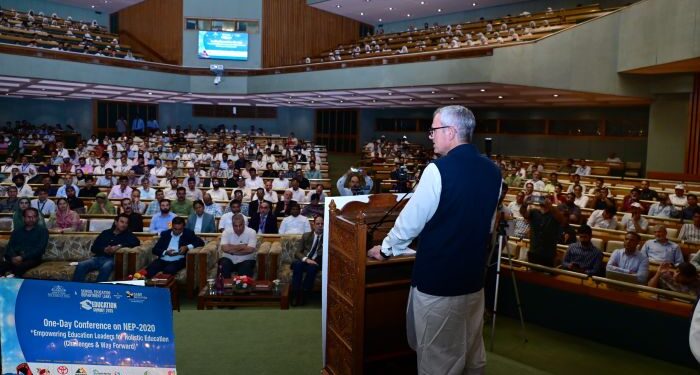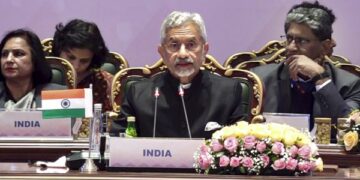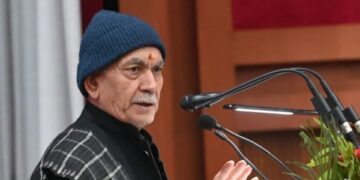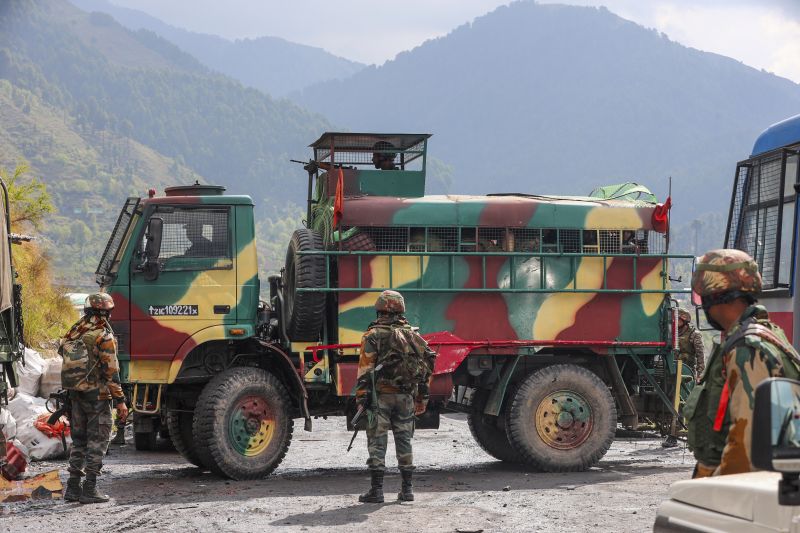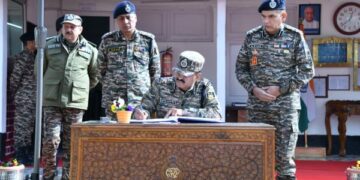Srinagar: Chief Minister Omar Abdullah today underscored the need for comprehensive, inclusive and locally adaptable implementation of the National Education Policy (NEP) 2020, calling it a visionary document whose success depends entirely on its understanding and execution at the grassroots level.
The Chief Minister was speaking at a day-long conference on NEP-2020 held at Sher-i-Kashmir International Convention Centre (SKICC), themed “Empowering Education Leaders for Holistic Education.”
According to an official press release, emphasizing the importance of reflection and course correction, the Chief Minister said, “The New Education Policy is now five years old. This is the time to evaluate where we have succeeded, where we have fallen short, and what more can be done to implement it better. A policy is only as effective as its application and understanding.”
Terming the NEP-2020 a “magnificent and far-reaching” framework, Omar Abdullah stressed that real change will come only when the policy is understood in its true spirit and implemented with sensitivity to local needs and realities.
He said the future of Jammu and Kashmir will be shaped significantly by the educators, policymakers, and institutional leaders who guide the younger generation. “You will decide how capable our children will be in contributing to the development of J&K and the country at large. You will shape their competitiveness, confidence, and capacity,” he added.
Pointing to persistent gaps in subject availability and staffing, the Chief Minister noted that many government schools and colleges are unable to offer a wide range of subjects due to faculty shortages. “In Jammu, only a few schools offer Urdu; in Kashmir, few offer Hindi. Even regional languages like Kashmiri, Dogri, or Punjabi are taught in very limited number of institutions. These gaps need to be filled gradually, within our available resources,” he said.
He also addressed frequent comparisons between government and private schools, highlighting that government institutions operate in areas where private schools often do not venture. “Setting up a school in Srinagar is easy. Try opening one in Gurez, Tangdhar, or Machil. Our teachers work in extreme conditions, away from the spotlight, and deserve recognition,” he stated.
Commending the spirit of innovation among students, the Chief Minister appreciated the exhibition held at the venue where students showcased practical solutions to real-life problems—ranging from water conservation, low-plastic alternatives, climate change awareness, to winter-specific water pipe systems.
“Our children don’t lack talent; they lack exposure and opportunities. Their creativity, thinking, and innovation give us hope that we are moving in the right direction,” he said.
Omar Abdullah also emphasized the importance of inclusivity in education. “Every child—regardless of physical or learning challenges—deserves a chance to learn. Are our schools truly inclusive and accessible to all? This workshop is a good step in that direction,” he said.
Speaking about the dynamic nature of education discourse, the Chief Minister observed that decisions regarding school holidays, exam schedules, and even online learning often spark debates in every household, reflecting the deep connection society has with the education system.
He acknowledged the challenges posed by the digital divide and affirmed that as the government’s financial capacity improves, efforts to bridge that divide will be intensified.
The Chief Minister said, “The future of Jammu and Kashmir is in the hands of our educators. You are not just teaching curriculum—you are shaping citizens, instilling values, and building futures. Let us work together to make our education system more resilient, inclusive, and transformative.”
The Chief Minister congratulated the organizers for holding the conference and expressed hope that such engagements will continue to inspire positive change across the education landscape of Jammu and Kashmir.
Earlier, Chief Minister Omar Abdullah visited the exhibition stalls set up by various government schools, showcasing innovative models and live demonstrations prepared by students and teachers.
Minister for Education, Sakina Itoo, also spoke on the occasion and said that one of the foremost priorities of the government, soon after its formation, was to reform the education system to make it more equitable, inclusive, and future-ready.
Vice Chancellor of the Islamic University of Science & Technology (IUST), Prof. Shakeel Romshoo, and Secretary, School Education, Ram Niwas Sharma also addressed the conference, sharing insights on the implementation and impact of NEP-2020.
The event was attended by Additional Chief Secretary to the Chief Minister, Dheeraj Gupta, Managing Director & CEO of J&K Bank, Amitava Chatterjee, Director of The Times of India Group, Rohit Sharma, Director School Education Kashmir, Dr. G.N. Itoo, along with senior officers, senior officials of the Education Department, Chief Education Officers, school principals, masters, teachers, NEP experts, students, and other stakeholders.
On the occasion, a Memorandum of Understanding (MoU) was also signed between IUST and the Directorate of School Education, Kashmir, to foster academic collaboration and strengthen school–university linkages.

